
Silvia Milena Corzo Pinto is a Colombian lawyer and presenter.

Dulce María Espinosa Saviñón, simply known as Dulce María, is a Mexican actress, songwriter, singer and author.
Domestic violence in Argentina is a serious issue. Since the 1990s onwards, the Government of Argentina has taken steps to address this problem. However, the policies of Argentina have been criticized for being weak, primarily due to focusing on civil, rather than criminal dealing with this form of violence, and for stressing conciliation between victim and perpetrator. The policy dealing with domestic violence has also been made more difficult due to the decentralized nature of the country: Argentina being a federal state with 23 provinces has caused significant regional variation between provincial policies on domestic violence, with women across the country having differing levels of protection.

General elections were held in Mexico on 1 July 2018. Voters elected a new President of Mexico to serve a six-year term, 128 members of the Senate for a period of six years and 500 members of the Chamber of Deputies for a period of three years. It was one of the largest election days in Mexican history, with most of the nation's states holding state and local elections on the same day, including nine governorships, with over 3,400 positions subject to elections at all levels of government. It was the most violent campaign Mexico has experienced in recent history, with 130 political figures killed since September 2017.
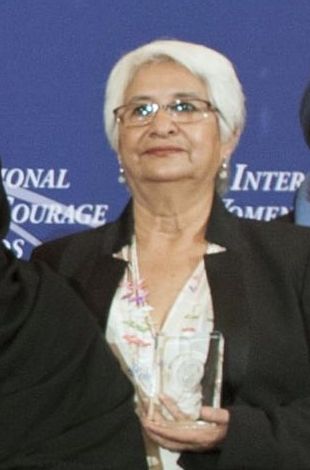
Rosa Julieta Montaño Salvatierra is a Bolivian attorney, human rights defender, woman's rights activist, feminist writer and a 2015 winner of the US State Department's International Women of Courage Award.
Carolina Papaleo is an Argentine actress of theater, film and television. She is the daughter of the actress Irma Roy and the journalist Osvaldo Papaleo. From a very young age she wanted to be an actress like her mother. In 2013 she debuted as a television presenter on a Channel 9 program Secretos de novelas which reviews telenovelas. She is a fan of the genre and watches four episodes a week to be able to review them. Papaleo is recognized and remembered for her role as Ana Oromi in the hit telenovela Una voz en el teléfono, which first brought her fame.

Soledad Cazorla Prieto was a jurist and the first Spanish prosecutor against gender violence. She directed a network of fiscal specialists who worked in this field in Spain after the creation of the 2004 Integral Law against Gender Violence. She held the position for a decade, from 2005 until her death. Remembered as a defender of equality, her professional career was closely linked to the development of this law.

LGBT in Argentina refers to the diversity of practices, militancies and cultural assessments on sexual diversity that were historically deployed in the territory that is currently the Argentine Republic. It is particularly difficult to find information on the incidence of homosexuality in societies from Hispanic America as a result of the anti-homosexual taboo derived from Christian morality, so most of the historical sources of its existence are found in acts of repression and punishment. One of the main conflicts encountered by LGBT history researchers is the use of modern concepts that were non-existent to people from the past, such as "homosexual", "transgender" and "travesti", falling into an anachronism. Non-heterosexuality was historically characterized as a public enemy: when power was exercised by the Catholic Church, it was regarded as a sin; during the late 19th and early 20th centuries, when it was in the hands of positivist thought, it was viewed as a disease; and later, with the advent of civil society, it became a crime.

Rocío Monasterio San Martín is a Spanish–Cuban architect, businesswoman and national-conservative politician. The leader of the Madrid branch of the Spanish political party Vox, she serves as a member of the 11th term of the Assembly of Madrid.
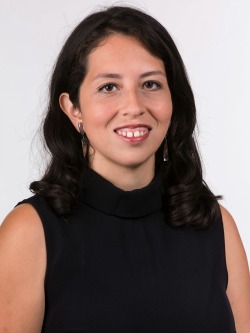
Gael Fernanda Yeomans Araya is a Chilean lawyer and politician. She was secretary general of the Libertarian Left movement. She is currently a member of the Chamber of Deputies for District 13.
Alejandra Mora Mora is a Costa Rican jurist, lawyer, professor, and politician. She has been a human rights activist, especially in the area of women's rights. She served as her country's Minister of Women's Affairs from 2014 to 2018, was president of the National Institute for Woman (INAMU), and director of the women's section of the Ombudsman's Office of Costa Rica.

On 9 February 2020, Ingrid Escamilla Vargas was murdered by her partner, Erik Francisco Robledo Rosas, at her home in Mexico City after an argument. The act outraged the public opinion of Mexico for the brutality with which it was perpetrated and for the subsequent spreading of images of the victim's body in the media and on social media.

Elizabeth Gómez Alcorta is an Argentine lawyer, professor and politician. She was the first Minister of Women, Genders and Diversity of Argentina, serving under President Alberto Fernández from 10 December 2019 to 7 October 2022.
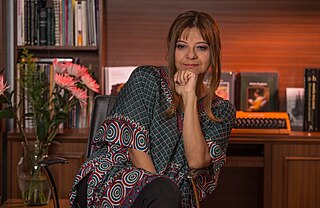
Isabel Agatón Santander is a Colombian poet, lawyer, writer and feminist. Promoter of the Rosa Elvira Cely Law which defines femicide as a crime in Colombia, she integrated the editorial commission of Law 1257 of 2008 about violence against women. She was a judge in the Tribunales de Conciencia de Justicia Para las Mujeres in Nicaragua (2015) and El Salvador in which they tried cases of sexual violence and femicide convened by the Red Feminista frente a la Violencia contra las Mujeres (REDFEM) and the Red contra Violencia of the respective countries.

Spain's National March in Opposition to Male Violence(s) Against Women, also known as 7N, was a mass citizen mobilisation, convened as a "feminist movement", which came to occupy the centre of Madrid on 7 November 2015. Organised by three hundred and thirty-two feminist organisations, it had the support of two hundred and twenty-two bodies, including political parties, unions and national and international feminist organisations, as well as one hundred and thirty-five district councils. The final event consisted in the reading of a manifesto compiling the condemnations and demands of the organisations involved, negotiated over nine months through working committees.

Victoria Tolosa Paz is an Argentine politician and public accountant. Since 2022, she has been Minister of Social Development in the cabinet of President Alberto Fernández.
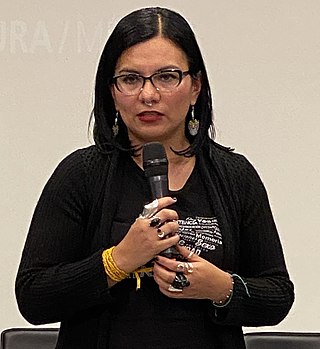
Raquel Ramírez Salgado is a Mexican researcher, communicator, feminist and women's rights activist.

Bertha Xóchitl Gálvez Ruiz is a Mexican computer engineer, businesswoman and politician. From 2015 to 2018 she served as mayor of the Miguel Hidalgo borough of Mexico City. From 2018 to 2023, she served as a senator in the LXIV and LXV Legislatures of the Mexican Congress. As senator she caucused with the center-right National Action Party, but often adheres to progressive politics on social issues such as abortion, drug policies and social spending. She completed her studies in computer engineering at UNAM's School of Engineering. In 2023, she was named the candidate of the Broad Front for Mexico for the 2024 Mexican presidential election.
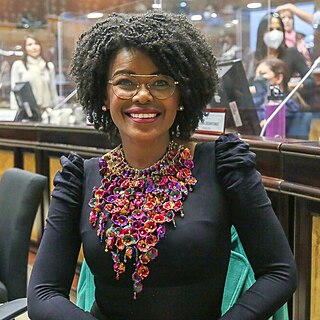
Janeth Paola Cabezas Castillo is an Ecuadorian politician and former television presenter. She was the Governor of Esmeraldas Province from 2013 to 2016 and is a current member of Ecuador's National Assembly for the Citizen Revolution Movement (RC). Cabezas was elected leader of the largest political coalition in the 2021 National Assembly, the Union for Hope (UNES).
Ana Milagros Parra is a Venezuelan political scientist. She has worked both as a researcher and interviewer in human rights organizations, later specializing in political risk analysis. Ana Milagros obtained her degree in political science at Rafael Urdaneta University and has been head of political analysis in the strategic risk analysis department at IURISCORP, a corporate legal consulting firm. She has been quoted in media such as El Mundo, elDiario.es, El Pitazo, Runrunes, Caraota Digital, Newsy, and Diario de Cuba, among others.
















